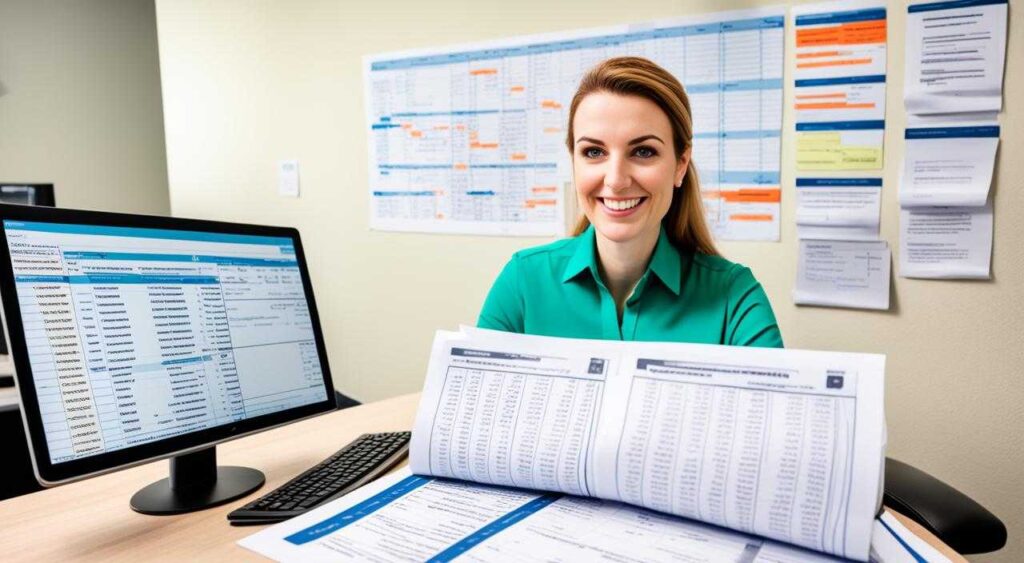Do you know that you can become a bookkeeper and start a rewarding financial career, no degree is needed. You’ll need to be detail-oriented, good with numbers, and skilled in software. With these skills, you’re ready to dive into the evolving world of bookkeeping.
Are you organized and good at analysis? Then a career as a bookkeeper could be for you. You don’t need a degree. Here, we’ll explore how to kick off your career with the right skills and experience.
Key Takeaways
- A degree is not mandatory to kickstart a bookkeeping career.
- Essential traits include attention to detail, organization, and numerical skills.
- Obtaining certification can enhance employment prospects and credibility.
- Hands-on experience is invaluable in mastering bookkeeping practices.
- Technological proficiency with bookkeeping software is increasingly important.
- Various resources are available for self-education in bookkeeping.
- The bookkeeping field offers diverse opportunities for non-degree holders.
Understanding the Bookkeeping Profession
Bookkeeping is crucial in finance. It’s a challenging yet rewarding job. We will look at the profession, key skills, and certifications’ role.
The Current Landscape and Outlook for Bookkeepers
Bookkeepers face many opportunities today. Their work is vital in a digital world. Technology has changed the job, focusing on analysis over data entry. Bookkeepers must stay updated while keeping core skills sharp.
The Essential Skills of a Bookkeeper
Key skills are vital for bookkeepers. They must be detail-oriented, good at math, and organized. Accuracy is critical. This ensures all records are correct. Good math skills help in managing finances. Being organized helps keep everything in order.
The Role of Certifications in Boosting Your Career
Certifications are now more important. They show a bookkeeper’s skills and knowledge. The American Institute of Professional Bookkeepers (AIPB) and the National Association of Certified Public Bookkeepers (NACPB) offer them. They help with career advancement and show commitment to the field.

How to become a bookkeeper without a degree
Thinking of becoming a bookkeeper without a degree? It can feel tough, but it’s doable with effort and the right advice. Let’s dive into the steps to becoming a bookkeeper. This will set you on a path to a fruitful career in bookkeeping.
- Assess Your Skills: Check your number skills, detail focus, and computer know-how first.
- Learn the Basics: Begin with basic bookkeeping courses at respected places or online.
- Gather Practical Experience: Look for volunteer work, internships, or beginner jobs for practical learning.
- Consider Certification: Get certifications from places like the AIPB or NACPB to boost your job chances.
- Upgrade Your Software Skills: Learn popular bookkeeping software to stand out in the job search.
- Network: Join groups related to bookkeeping and accounting both online and face-to-face to meet pros in the field.
On this journey to become a bookkeeper, gathered various experiences and skills. Let’s look at what each step offers:
| Step in Path | Skills Gained | Benefits |
|---|---|---|
| Learn the Basics | Understanding of fundamental bookkeeping principles | Strong base for learning more and practicing |
| Gather Practical Experience | Hands-on problem solving and software usage | Real insights into daily bookkeeper tasks |
| Consider Certification | Formal recognition of competencies | Better job chances and potential for more pay |
| Upgrade Your Software Skills | Proficiency in important tools | Skills to manage complex financial records well |
| Network | Connections with experts and potential mentors | Opportunities for jobs and industry insights |
The idea of becoming a bookkeeper without a degree might seem hard at first. Yet, plenty of resources and support exist to help you build a satisfying career in bookkeeping. Follow these steps and keep improving your experience and knowledge. This way, you’ll lay a strong foundation for a successful career.

Building Your Foundation: Essential Skills and Training
To start a career in bookkeeping, learning essential skills for bookkeepers is key. Success depends on having knowledge and skills. It also requires understanding the job’s practical side through bookkeeping training.
Online Resources and Inexpensive Courses for Aspiring Bookkeepers
The Internet offers many online courses for bookkeepers that are affordable and flexible. Beginners and those wanting to improve can find many types of courses. These range from basic to advanced levels.
- Foundational accounting principles
- Taxation basics
- Payroll management courses
- Financial reporting standards tutorials
Online learning lets people build a strong base of knowledge at their own pace. Many do it from home.
On-the-Job Training: Learning By Doing
One of the best ways to learn bookkeeping is through on-the-job training for bookkeepers. Hands-on experience helps apply what you’ve learned to real situations. This helps you understand daily tasks and what’s expected better.
Key benefits include:
- Direct exposure to bookkeeping software and tools in use
- Immediate feedback and guidance from seasoned professionals
- Learning the nuances of industry-specific bookkeeping requirements
Embracing the Digital Era: Bookkeeping Software Proficiency
In today’s tech-driven world, bookkeepers must know software skills for bookkeepers. Being good with top bookkeeping software makes work efficient and accurate. It also helps meet the changing needs of clients or employers.
| Bookkeeping Software | Skills Developed | Industry Relevance |
|---|---|---|
| QuickBooks | Financial reconciliation, invoicing, payroll processing | Widely used among small to medium-sized businesses |
| Xero | Cloud accounting, data analysis, reporting | Increasing adoption by tech-savvy firms and freelancers |
| FreshBooks | Expense tracking, project timekeeping, client billing | Popular with service-based businesses and entrepreneurs |
| Sage 50cloud | Inventory management, job costing, compliance tools | Essential for companies requiring robust analytics and insights |
Embracing these tools boosts bookkeepers’ skills. It greatly increases their value in the market.
Certification vs. Experience: What Counts More?
In bookkeeping, people often discuss which is more valuable: bookkeeping certification or work experience in bookkeeping. Let’s look into the importance of experience, what certifications mean, and how they help bookkeepers succeed.
The Significance of Work Experience in Bookkeeping
Work experience in bookkeeping lays a solid foundation for success. It helps you understand basic principles through practice. It also teaches you things a class can’t.
Employers value the skills you learn on the job. They believe it shows you can handle complex bookkeeping tasks.
Certification Bodies: AIPB and NACPB Explained
The AIPB certification and NACPB certification are highly respected in bookkeeping. The American Institute of Professional Bookkeepers gives a certification that proves your knowledge and ethics. The National Association of Certified Public Bookkeepers gives credentials that show you understand accounting principles well. Both certifications keep you up-to-date with bookkeeping standards.
Advancing Your Career with Certified Bookkeeper Credentials
Having certifications can push your career forward. They make employers and clients trust you more. This can lead to better jobs and pay. But it’s also important to keep learning and getting experience.
While experience shows you can handle real problems, certifications like those from AIPB and NACPB can boost your career. Balancing experience and certification helps bookkeepers succeed.
Opportunities for Non-Degree Holders in Bookkeeping
The bookkeeping landscape is changing. This brings job opportunities for non-degree bookkeepers that are flexible and within reach. Big and small businesses need skilled folks to manage their money matters. This growth opens doors for those skilled through experience or other learning ways. Here, we explore different jobs for non-degree bookkeepers, showing how this field is evolving.
Especially small businesses have many non-degree bookkeeping jobs. They need passionate professionals ready to tackle various tasks. The nonprofit world also offers rewarding roles for bookkeepers eager to help with financial management. For those wanting flexibility, freelancing lets you build a diverse client list. This setup lets you choose a work style that fits your life.
- Local Small Business – Becoming an integral part of a community business’s growth
- Nonprofit Organizations – Supporting missions through fiscal responsibility
- Freelance Bookkeeping – Setting your hours and choosing your clients
- E-commerce and Online Enterprises – Bringing financial expertise to the digital marketplace
You don’t need a college degree to start in bookkeeping. Hands-on experience and a love for learning can kick off careers in bookkeeping. These careers value flexibility, adaptability, and a strong work ethic. The path ahead in finance shows endless growth opportunities for bookkeepers. Your success is only limited by your drive to achieve.
Conclusion
Becoming a bookkeeper with no degree is possible with hard work, a love for learning, and a proactive stance. We have explored how bookkeeping is open to those with the right skills and work experiences. A formal degree isn’t needed to start, but practical experience and certifications matter a lot.
There are many ways to start a career in bookkeeping. With new technology and changes in finance, bookkeepers are needed more than ever. They work in many areas like business, schools, and non-profits. This career offers a solid base for those who like numbers and financial details.
The bookkeeping field is welcoming to those ready to learn and grow. With a good job outlook, gaining skills and certifications is key. Start by building your abilities and never stop learning. Bookkeeping is where carefulness meets opportunity, making every detail important.
FAQ
Can I become a bookkeeper without a degree?
Yes, becoming a bookkeeper without a degree is possible. Having some postsecondary education or certification is helpful. It can make your job prospects and earnings better.
What skills are essential for a bookkeeper?
Key skills for bookkeepers include attention to detail, math skills, and being organized. These help them record transactions accurately, analyze data, and keep finances tidy.
Do certifications help boost my bookkeeping career?
Certifications boost your bookkeeping career. Getting certifications from places like the American Institute of Professional Bookkeepers (AIPB) or the National Association of Certified Public Bookkeepers (NACPB) shows your skill and dedication.
How can I become a bookkeeper without a degree?
Without a degree, you have two main options for becoming a bookkeeper. You can either study accounting or business for a firm understanding of finance. Or, start in an entry-level job and gain experience on the job.
What training options are available for aspiring bookkeepers?
Aspiring bookkeepers can learn online or take affordable courses. On-the-job training and practice are key to learning bookkeeping. Learning to use bookkeeping software well is also crucial.
Which is more important, certification or work experience?
Both are important in bookkeeping. Work experience lets you apply what you know. Certifications show your skill and dedication. It’s best to have both for better job chances and career growth.
What job opportunities are available for individuals without a degree in bookkeeping?
Many job opportunities exist for those without a bookkeeping degree. Bookkeepers are needed in various settings like small businesses, nonprofits, and freelancers. These roles offer a chance to grow in your career.
